Previous Article
News
“Road offenders” – literature review and the BRiSaR project
Lately I have seen many programs or interventions using visits to the morgue or hospitals to deter people from overspending or drive while intoxicated. In order to understand what is effective in reducing reoffending among those sentenced for road offences, we have run a comprehensive literature review of evidence and good practices at the international level.
An article written by professor Ioan Durnescu, University of Bucharest, Romania
Literature review
It was impressive to see the amount of the literature available on programs reducing the recidivism among those convicted for this type of offences (see Wundersitz and Hutchinson, 2006 – for DIP; Freeman, Schonfeld and Edmonston, 2006; Clark et al, 2015; Feiburger and Sheeran, 2019 and so on). However, with only a few exceptions (see Schulze, 2012), the impact of most programs was evaluated using one or two years follow up with no control groups. Therefore, although the evidence is out there, its replicability and robustness may be questioned.
What we can conclude so far is that multimodal and multidisciplinary approaches are more effective than the ones using only one type of intervention. In other words, programs based on education, rehabilitation, health and punishment seem to work better than the ones based on education only. Furthermore, programs that combine complex programs with urine testing, probation supervision and driving wheel control locker produce lower reoffending rates than those based only on urine testing or electronic monitoring. The latter proved to be quite effective during the action of those devices but this positive effect tends to disappear once the device is removed (Elder et al, 2011; Houwing, 2016).
Miller at al (2015) conducted an international systematic review on the interventions for men and women convicted for drive under influence (DUI). Their conclusions were that multicomponent programs which address a range of issues pertinent to this type of offending were found effective. However, they found that participants in scare straight or victim impact panels (as they are called in US) are as likely to re-offend as non-participants and sometimes more likely. These programs are based on confronting the authors of these crimes with the survivors of accidents caused by drunk drivers or expose them to shocking images with victims of accidents in the morgue. These conclusions are in line also with another research conducted by Crew and Johnson (2010) and also with the general deterrence literature that suggests that punishment or the threat of punishment can have an impact for a moment but with no other changing pressure this memory will disappear allowing the past behavior to perform. Think of the speeding fines we receive sometimes. How effective are they in changing our driving style? Maybe they have an impact but only in combination with other factors – such as for example ageing, birth of a child or a cognitive behavior program.
BRiSaR project
This literature review will inform the creation of a new program/intervention for those sentenced for road offences under the Bringing Safety on the Roads (BriSaR) project funded by ERASMUS + and coordinated by European Strategies Consulting/Romania in partnership with Direcao-Geral de Reinsercao e Servicos Prisionais/Portugal, Aproximar/Portugal, Qualify Just/Portugal, Ankara Probation Service/Turkey and University Loyola Andalucia/ Spain.

Related News
Keep up to date with the latest developments, stories, and updates on probation from across Europe and beyond. Find relevant news and insights shaping the field today.
New
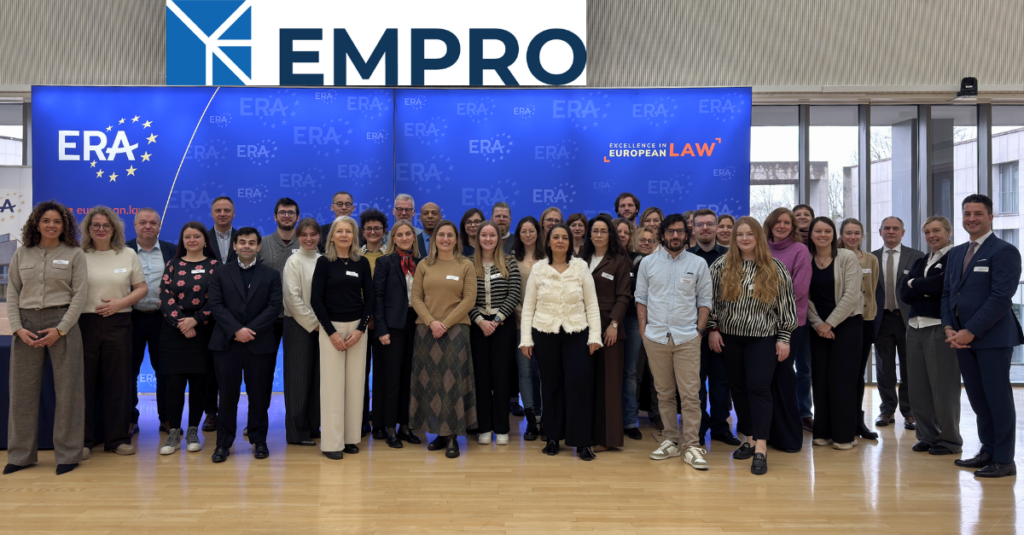
Uncategorized
CEP at the EMPRO Symposium hosted by ERA
04/02/2026
CEP actively contributed to the EMPRO Knowledge Exchange Symposium hosted by the Academy of European Law (ERA) in Trier on 28–29 January, bringing together practitioners, policymakers, and researchers to reflect on the implementation of EU Framework Decisions in probation and supervision.
New

Alternatives to pre-trial detention, Community Sanctions and Measures, Framework Decisions, Technology
Future of Criminal Justice: CEP’s Contribution to Key 2025 Dialogues
27/01/2026
Throughout 2025, CEP and its representatives actively participated in the online Technical meetings ahead of the HLF as well as the High Level Forum on Future of Criminal Justice taking place on 4-5 March 2025, 20-21 May 2025 and 1-2 October 2025 in Brussels, Belgium.
Recap
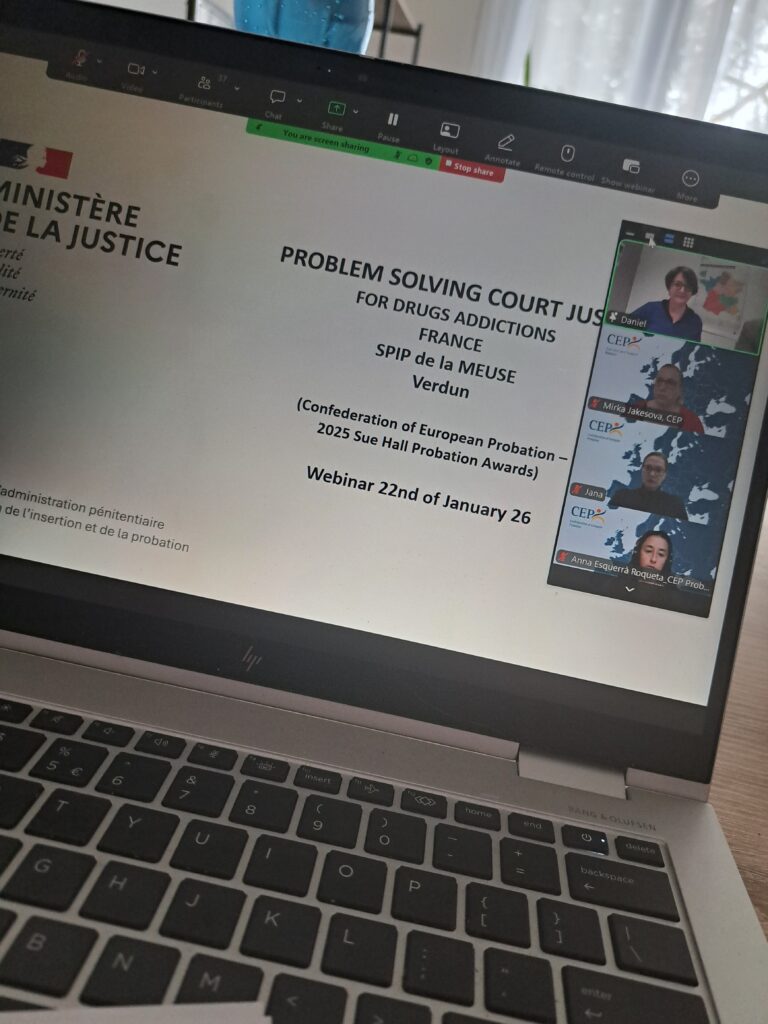
Alternatives to pre-trial detention
Recap: Webinar on Alternatives to Detention 2026
26/01/2026
On Thursday 22 January, CEP hosted the first webinar of 2025 on the topic of Alternatives to Detention. The session led by Ms. Marina Pajoni from the French Prison and Probation Service titled „Problem Solving Justice in Pracitce: The Meuse Probation Service´s Approach to Drug Addiction“ introduced an innovative programme developed by the Meuse Probation Service in close cooperation with the French Ministry of Justice.
New
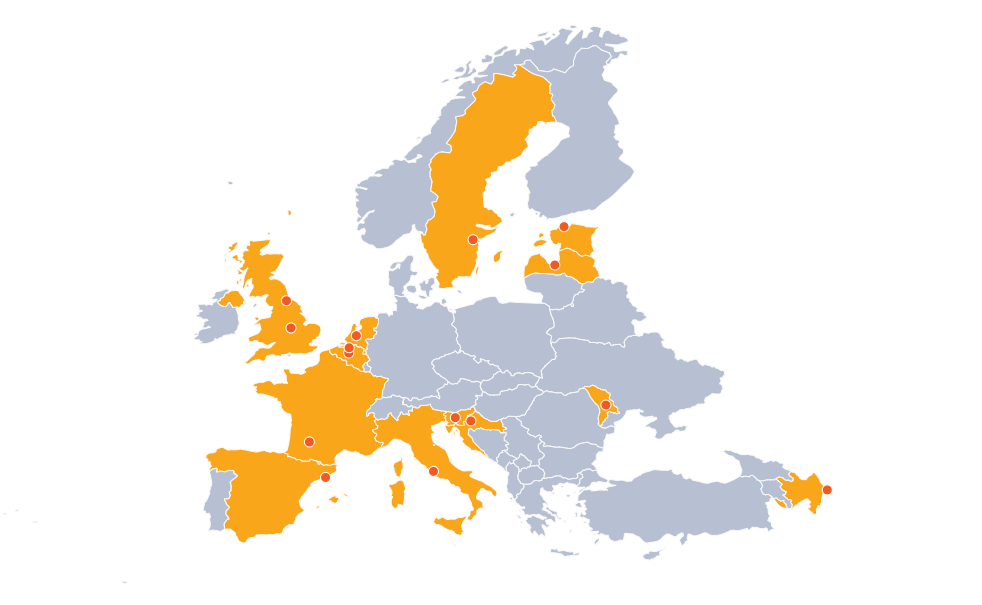
Education and Training
CEP launches an interactive European map of probation education and training institution contacts
22/01/2026
The CEP is pleased to inform its members that a new dedicated section has been developed on the CEP website featuring an interactive map of Europe.
New
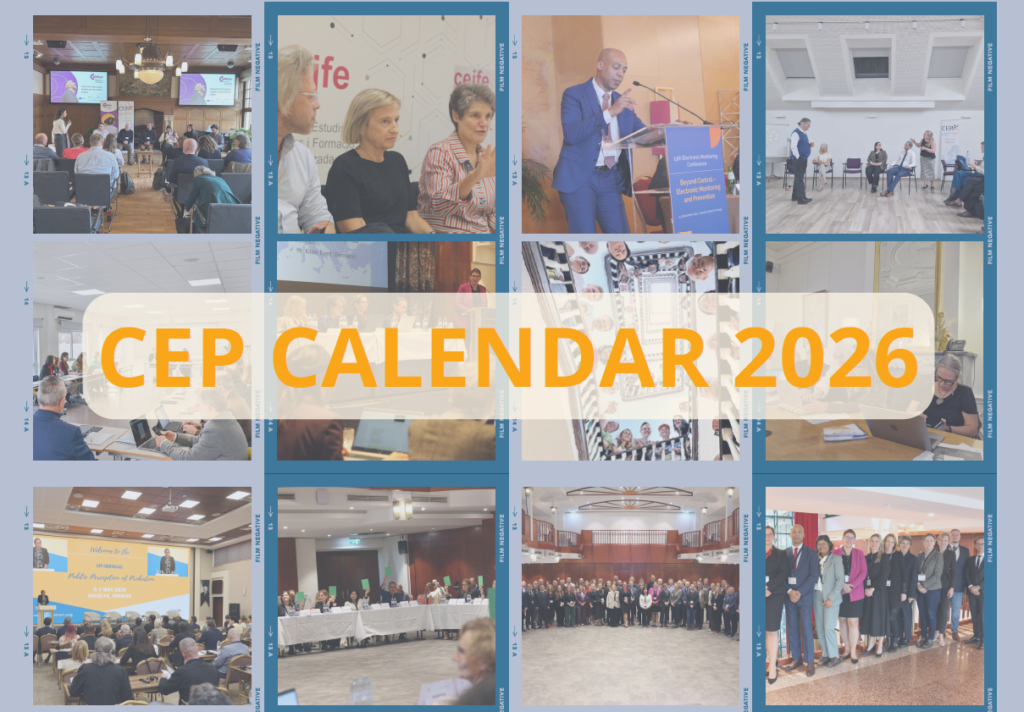
CEP Events
CEP activity calendar 2026
20/01/2026
As we begin the new year, we would like to thank all CEP members, partners, and participants for your continued engagement and valuable contributions. Your involvement plays an essential role in shaping CEP’s work and activities.
We are pleased to share the CEP calendar for 2026, which provides an overview of the events planned for the year ahead. We look forward to continuing our collaboration and welcoming you to upcoming CEP activities throughout the year.
Thank you for being part of the CEP community.
New
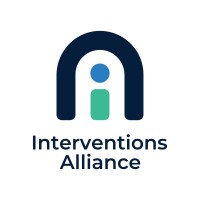
CEP members, Gender-based violence
Interventions Alliance’s Eden House Recognized as Outstanding
15/01/2026
CEP is delighted to share that Eden House, an Interventions Alliance residential service for women with high-risk or complex needs on probation, has been rated “Outstanding” overall by HM Inspectorate of Probation. In 2022, Eden House was honored with the CEP Public Protection Award. Our sincere congratulations to the team for this remarkable achievement.
Subscribe to our bi-monthly email newsletter!
"*" indicates required fields
- Keep up to date with important probation developments and insights.

